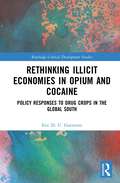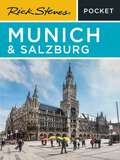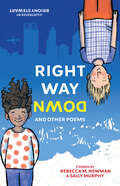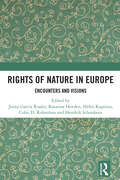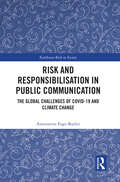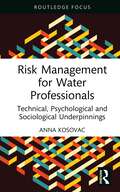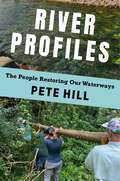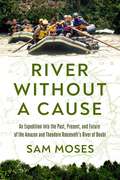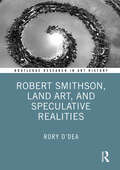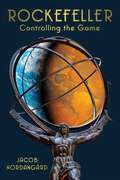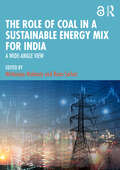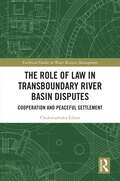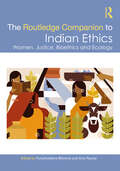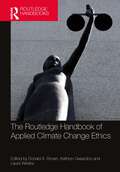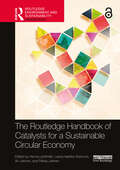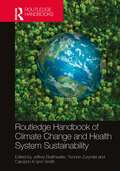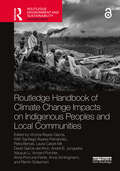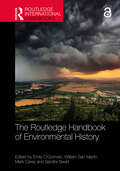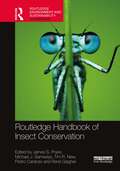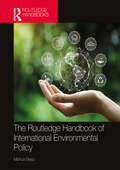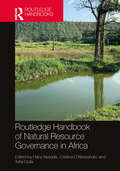- Table View
- List View
Rethinking Illicit Economies in Opium and Cocaine: Policy Responses to Drug Crops in the Global South (Routledge Critical Development Studies)
by Eric D. GutierrezThis book investigates the cross-border trade in illicit drug crops in the global south. It exposes an important paradox: despite all the dangers and negative consequences of these criminal networks, in many cases, they also provide marginalised and excluded communities with important private sources of protection, investment, and employment. This book reconstructs and compares socioeconomic contexts, criminal careers, and changes in farmgate prices of illicit coca and opium poppy crops in Afghanistan, Myanmar, Colombia, and Bolivia. It investigates the politics of strange bedfellows; informal bankers-without-suits providing cross-border financial services to the undocumented and the unbanked; the criminals without borders; and the mystery of illicit crop prices. The book challenges commonly held assumptions and casts new light on how relationships of conflict and accommodation are arranged and re-arranged in fluid, ever-changing contexts, producing often paradoxical outcomes. It then suggests policy reforms and alternative approaches to drug policy, development aid, and peacebuilding work. Researchers and students across development, peacebuilding, illicit economies, and conflict studies will find this book an important source of original research and analysis. It will also be useful for politicians, commentators and public officials considering what to do differently in tackling illicit drug economies.
Rick Steves Pocket Munich & Salzburg (Rick Steves Pocket)
by Rick StevesMake the most of every day and every dollar with Rick Steves! This colorful, compact guidebook is perfect for spending a week or less in Munich and Salzburg: City walks and tours: Five detailed self-guided walks including a Munich city walk, Nymphenburg Palace tour, Sound of Music tour, and more Rick's strategic advice on what's worth your time and money What to eat and where to stay: Savor Bratwurst from a streetside Würstelstand, mingle with locals at a beer hall, and stay at a traditional Bavarian bed-and-breakfast Day-by-day itineraries to help you prioritize your time A detailed, detachable fold-out map, plus museum and city maps throughout Full-color, portable, and slim for exploring on-the-goTrip-planning practicalities like when to go, how to get around, basic German phrases, and more Lightweight, yet packed with info on the cities' history and culture, Rick Steves Pocket Munich & Salzburg truly is a tour guide in your pocket. Extending your trip? Try Rick Steves Best of Germany.
Ride Beside Me
by Lucy KnisleyThe community that rides together, thrives together! New York Times bestselling comic creator Lucy Knisley celebrates the joys of biking in this picture book about coming together to build safer streets and a brighter future for all.A mother and son hop on their bike for a ride through the neighborhood, joining friends and neighbors along the way. There are people on unicycles and tandem bikes, tricycles and recumbents—all kinds of bikes for all kinds of riders.Before long, the bikes outnumber the cars and trucks, taking up more and more of the road until they form a parade of sorts, smiling and popping wheelies, ringing their bells, and celebrating the beautiful community they all share.
Right Way Down: A middle-reader poetry collection
by Sally MurphyStand on your head with Sally Murphy, explode some dynamite with Cristy Burne or shoot some hoops with Cheryl Kickett-Tucker. Grow a poettree with Meg McKinlay or curl up next to your cat with Amber Moffat and watch a bit of Stink-o-Vision with James Foley. These and loads more poems by Australian poets are there to discover in Right Way Down. With striking illustrations by Briony Stewart, these poems will have you laughing, thinking, and playing with words – whichever way you read them.
Rights of Nature in Europe: Encounters and Visions
by Jenny García Ruales Katarina Hovden Helen Kopnina Colin D. Robertson Hendrik SchoukensThis book addresses the recognition of the Rights of Nature (RoN) in Europe, examining their conceptualisation and implementation. RoN refers to a diverse set of legal developments that seek to redefine Nature's status within the law, gradually emerging as a novel template for environmental protection. Countries like Ecuador and New Zealand, each with distinct histories and ways of dwelling in the world, have pioneered a new era in environmental governance by legally acknowledging rights or personhood for nature, ecosystems, and more-than-human populations.In recent years, Europe has witnessed growing interest in RoN, with academic, legislative, and political initiatives gaining momentum. A significant development is the September 2022 passage of a law in the Spanish Parliament, granting legal personhood and rights to the Mar Menor, a saltwater lagoon severely affected by environmental degradation.Given the diversity in interpretations and articulations of ‘Rights of Nature’, this edited volume argues that their arrival in Europe fosters different kinds of interactions across distinct areas of law, knowledge, practices, and societal domains. The book employs a multidisciplinary approach, exploring these interactions in law and policy, anthropology, Indigenous worldviews and jurisprudence, philosophy, spiritual traditions, critical theory, animal communication, psychology, and social work.This book is tailored for scholars in law, political science, environmental studies, anthropology and cultural studies; as well as legal practitioners, NGOs, activists and policy-makers interested in ecology and environmental protection.
Risk and Responsibilisation in Public Communication: The Global Challenges of COVID-19 and Climate Change (Earthscan Risk in Society)
by Antoinette Fage-ButlerThis book explores the connections between risk and responsibilisation in official communication to the public about the global risks of the pandemic and climate change. Our media spheres in the 2020s have been saturated with information about what we should or should not be doing to meet the challenges of the COVID-19 pandemic and climate change. Although the ability of risk communication to ‘responsibilise’ the public is central to its functioning in our societies, this aspect has so far been under-investigated in academia. To address this lacuna, Antoinette Fage-Butler develops a discursive approach to risk communication that focuses on the values that are communicated in risk messages. Examples of official risk communication about the pandemic and climate change from national and transnational contexts are analysed and compared, leading to new empirical findings and theoretical insights about the nature of risk and responsibilisation. Fage-Butler also builds on recent stirrings in the evolving field of risk communication that highlight the importance of cultural and value-related factors. Overall, this book will equip researchers with an approach to risk communication that reflects the complexity of today’s global risk challenges. Risk and Responsibilisation in Public Communication will be of great interest to students and scholars of risk communication, public health and environmental studies.
Risk Management for Water Professionals: Technical, Psychological and Sociological Underpinnings (Routledge Focus on Environment and Sustainability)
by Anna KosovacThis book presents a comprehensive view of the different theories of risk management in water, drawing on recent studies that serve to inform the way that practitioners consider their own risk practice.While it is commonplace to see risk described in technical and engineering terms when discussing water, this book argues that this is a flawed practice that results in poor decision-making, particularly where water intersects with social elements and the community. Challenging these traditionally held notions of risk, this book introduces the psychological and sociological underpinnings to water risk decisions. Using these, it argues for a broader view of risk-based thinking and proposes a number of evidence-based actions for policymakers to directly implement. Drawing on primary research conducted with water professionals across a variety of roles, this book highlights how the effect of psychological inputs, such as dread and reputation, can create barriers to implementing novel water solutions or projects. Through understanding the biases covered in this book, water practitioners can work to support processes that seek to encourage new and innovative methods in water management.This book will be of great interest to professionals working in water management, including those in government roles, planning departments and consultancies. It is also a great reference for students of both water resource management and risk studies more generally.
River Profiles: The People Restoring Our Waterways
by Pete HillCenturies of mismanagement and destructive development have gravely harmed American waterways, with significant consequences for the ecosystems and communities built around them. But a range of passionate and committed people have stepped up to restore streams and rivers around the United States. A husband-and-wife scientist team in Pennsylvania lead projects to unclog the sediment left by early colonists’ dams. Members of the Tulalip Tribes in western Washington State bring beavers back to headwater streams. A public servant in Milwaukee drives the sewer department to remove concrete channels and reduce flood risk. Community activists in Atlanta push for environmental justice in river restoration.Telling these stories and many more, Pete Hill—a twenty-year veteran of the field of watershed restoration—provides a deep dive into the world of river and stream conservation. He profiles the practitioners, scientists, and activists from all walks of life who take part in restoration efforts, exploring their differing, sometimes controversial approaches. Through their stories, Hill illustrates the challenges and rewards of river restoration and the evolving scientific understanding in the field. Underscoring the need for a variety of strategies adapted to different local contexts, he shows that new ideas have come from a wide range of people—from those operating the machinery to those researching stream ecology—and that Indigenous knowledge offers vital resources. At once personal and learned, insightful and inspiring, this book shines a light on the people working to heal our streams and rivers.
River Without a Cause: An Expedition through the Past, Present and Future of Theodore Roosevelt's River of Doubt
by Sam MosesA riveting journey down Theodore Roosevelt's "river of doubt" with a diverse crew of adventurers, scientists, and Indigenous leaders who shine light on the past, present, and future of a natural wonder.Sam Moses took part in the adventure of a lifetime when he, along with seventeen men and two women, embarked on the Rio Roosevelt Expedition. They would follow the former president's wake down five-hundred miles of extreme whitewater into the dark heart of the Amazon. The party was guided by two chiefs from the Cinta Larga tribe—the same tribe that stalked Roosevelt&’s expedition in 1914—who, between rapids, tell the story of the tribe&’s own Trail of Tears. After the wildest whitewater is past, Moses travels with the chiefs to their village to witness the massive illegal mahogany logging from their forest, the Roosevelt Indigenous Territory. River Without a Cause puts us in the raft during those heart pounding rapid descents, as we experience the drama, dynamics and disputes between the Bull Moose and his co-leader, Brazil&’s most famous explorer, the rigid Colonel Candido Rondon. As the Amazon stands on the precipiece of hope with the election of a new Brazillian president, River Without a Cause is a moving and galvanzing tale of adventure that is a fitting tribute to this world wonder.
Robert Smithson, Land Art, and Speculative Realities (Routledge Research in Art History)
by Rory O'DeaThis book explores the ways Robert Smithson’s art revealed and defamiliarized the constructs of rational reality in order to allow radically speculative alternatives to emerge. In this way, his art is conceived as a true fiction that eradicates a false reality. By tracing the web of correspondences between Smithson and science fictional, speculative and mystical modes of thought, Rory O’Dea explores the aesthetic encounters engendered by his art as a means to warp the contours of reality and loosen the boundaries of being human. Given the current and impending catastrophes of the Anthropocene, which represents the ever-expanding planetary shadow cast by humanism, the possibility of being other-than-human posited by Smithson’s art is a matter of urgent concern. The book will be of interest to scholars working in art history, contemporary art, American studies and environmental humanities.
Rockefeller: Controlling the Game
by Jacob NordangårdWhy would the first family of oil so ardently support environmental climate research and activism? Join author and researcher Jacob Nordangård as he uncovers the whole sordid truth. The Rockefeller family is one of the richest in the world. Yet, why would the family that made the world dependent on oil fund environmental and climate research since the 1950s, help shape climate policy measures since the 1980s, and supported climate activism since the 1990s? Rockefeller: Controlling the Game is the thrilling and paradoxical story of one of the world's most influential global players. Through its top position in American business, close contacts with the White House, and with their immense financial power as one of the world's leading private research funders, the Rockefellers have been able to anchor the climate issue both scientifically and politically. Yet what is the reasoning behind doing so? Author and researcher Jacob Nordangård follows the family from the founding of Standard Oil and the Rockefeller Foundation, up through the aftermath of the Paris Agreement, with the declaration of the Fourth Industrial Revolution in January 2016, to the present day. Nordangård's in-depth research includes the large quantities of new material recently made available on the Internet, as well as the Rockefeller Foundation's own annual reports. Nordangård's main focus is the Rockefeller family's involvement in climate research and politics, but the actions and motives of some of their allies are also explored, as well as the family's influence on the development of modern medicine, family planning, agriculture, art, architecture, behavioral science, information technology, and politics. The Rockefeller family's utopian dream of a perfect world will have serious consequences for the survival of the human species and life as we know it. The Rockefeller Foundation's stated mission to "promote the well-being of humanity throughout the world" has a dark flipside, as, Nordangård will prove, the Rockefeller family's long-standing battle against climate change contains elements of sophisticated propaganda techniques, futurism, and New Age philosophy, aiming at a complete transformation of the whole earth system, including economy, ecology, culture, and even humanity itself.
The Role of Coal in a Sustainable Energy Mix for India: A Wide-Angle View
by Mritiunjoy Mohanty and Runa SarkarAs India switches away from a coal-based to a more sustainable energy use pattern, which pathway will it adopt? What is the nature of challenges that it will face, and who will be affected? Who will gain? This volume offers insights into the steps and challenges involved in this transition and addresses some urgent questions about the possible pathways for India’s renewable energy generation. Including contributions from researchers, policymakers, and practitioners, it draws on different disciplines, ranging from science and technology to economics and sociology, and situates the issue of low carbon transition within an interdisciplinary framework. India has committed to gradual decarbonisation of its economy. This book takes this as its starting point and uses a wide-angle lens, incorporating macro as well as micro views, to understand the possible next steps as well as trade-offs that will inevitably be posed. It incorporates the perspectives of all stakeholders ranging from central and state governments, public and private sector firms, on the one hand, to individuals and local communities, on the other, to explore their role in the transition, their interests, and how these will change and evolve. This timely volume will be of interest to students and researchers of environmental studies, development studies, environmental economics, political studies, and Asian studies. It will also be useful to academics, practitioners, and policymakers working on issues related to climate change, sustainable development, energy policy and economics,and public policy.
The Role of Law in Transboundary River Basin Disputes: Cooperation and Peaceful Settlement (Earthscan Studies in Water Resource Management)
by Chukwuebuka EdumThis book examines the role legal rules play in the resolution of disputes in transboundary river basins. When states fail to resolve disputes over shared water resources, many cast such failures on inadequate or ineffective legal rules. With this view in mind, this book examines the role that legal rules do, and can, play in aiding the peaceful settlement of disputes and furthering cooperation between different parties. Building on the interactional theory of law, this book formulates three analytical frameworks: the effect of norm-generating processes, the effects of water-related agreements and/or arrangements in the basins, and the effect of international water. It uses these frameworks to assess the role of law in the processes of cooperation and peaceful settlement of disputes on transboundary river basin by drawing on four illustrative case studies: the Jordan River Basin, the Nile River Basin, the Mekong River Basin, and the Indus River Basin. In doing so, this book presents a unique perspective on the multi-functional role of legal rules in those processes. Tapping into the global discussion on water security and water-related conflicts, this book stimulates readers to explore broader or interdisciplinary perspectives for understanding water-related issues. This book will be of great interest to students and scholars interested in water resource management, water law, environmental politics, conflict resolution, and sustainable development more generally.
The Routledge Companion to Indian Ethics: Women, Justice, Bioethics and Ecology
by Purushottama Bilimoria Amy RaynerThis companion volume focuses on the application and practical ramifications of Indian ethics. Here Indian dharma ethics is moved from its preeminent religious origins and classical metaethical proclivity to, what Kant would call, practical reason – or in Aristotle’s poignant terms, ēhikos and phronēis –and in more modern parlance normative ethics. Our study examines a wide range of social and normative challenges facing people in such diverse areas as women’s rights, infant ethics, politics, law, justice, bioethics and ecology. As a contemporary volume, it builds linkages between existing theories and emerging moral issues, problems and questions in today’s India in the global arena. The volume brings together contributions from some 40 philosophers and contemporary thinkers on practical ethics, exploring both the scope and boundaries or limits of ethics as applied to everyday and real-life concerns and socio-economic challenges facing India in the context of a troubled globalizing world. As such, this collection draws on multiple forms of writing and research, including narrative ethics, interviews, critical case studies and textual analyses.The book will be of interest to scholars, researchers and students of Indian philosophy, Indian ethics, women and infant issues, social justice, environmental ethics, bioethics, animal ethics and cross-cultural responses to dominant Western moral thought. It will also be useful to researchers working on the intersection of Gandhi, sustainability, ecology, theology, feminism, comparative philosophy and dharma studies.
The Routledge Handbook of Applied Climate Change Ethics (Routledge Handbooks in Applied Ethics)
by Donald A. Brown Kathryn Gwiazdon Laura WestraThe Routledge Handbook of Applied Climate Change Ethics is a powerful reference source for the identification and exploration of the underlying ethical issues in climate change law and policy. Bridging theory with practice, it takes ethical engagement out of the classroom and into the halls of governance. The Handbook‘s 39 chapters--written by a diverse and inter-disciplinary team of experts from around the world--are case studies divided into five parts. Parts I-IV highlight the ethical issues that arise in climate change policy formation, from duties not to harm to duties to consider the views and voices of those who will be, or are being, harmed; from the role of human rights, justice, and democracy to how to identify and respond to disinformation and denialism. It also raises the ethics of various policy responses, such as cap-and-trade, carbon taxing, and geo-engineering. Part V offers a way forward, with strategies on how to expressly consider ethics in climate change policy formation, from negotiations to education, media, communication, and the power and potential of shaming. The volume is essential reading for students, professors, and practitioners who wish to better engage with government and non-government organizations on climate policy, to better understand the practical application of the theory and philosophy of ethics, and how to more strongly draft and defend ethical action in negotiating, drafting, and defending climate change law and policy.
The Routledge Handbook of Catalysts for a Sustainable Circular Economy (Routledge Environment and Sustainability Handbooks)
by Hanna Lehtimäki Leena Aarikka-Stenroos Ari Jokinen Pekka JokinenThis groundbreaking handbook leads the way in accelerating the transition to a sustainable circular economy by introducing the concept of a catalyst as a positive and enhancing driving force for sustainability. Catalysts create and maintain favourable conditions for complex systemic sustainability transition changes, and a discussion and understanding of catalysts is required to move from a linear economy to a sustainable and circular economy. With contributions from leading experts from around the globe, this volume presents theoretical insights, contextualised case studies, and participatory methodologies, which identify different catalysts, including technology, innovation, business models, management and organisation, regulation, sustainability policy, product design, and culture. The authors then show how these catalysts accelerate sustainability transitions. As a unique value to the reader, the book brings together public policy and private business perspectives to address the circular economy as a systemic change. Its theoretical and practical perspectives are coupled with real-world case studies from Finland, Italy, China, India, Nigeria, and others to provide tangible insights on catalysing the circular economy across organisational, hierarchical, and disciplinary boundaries. With its broad interdisciplinary and geographically diverse scope, this handbook will be a valuable tool for researchers, academics, and policy-makers in the fields of circular economy, sustainability transitions, environmental studies, business, and the social sciences more broadly.
The Routledge Handbook of Catalysts for a Sustainable Circular Economy (Routledge Environment and Sustainability Handbooks)
by Hanna Lehtimäki Leena Aarikka-Stenroos Ari Jokinen Pekka JokinenThis groundbreaking handbook leads the way in accelerating the transition to a sustainable circular economy by introducing the concept of a catalyst as a positive and enhancing driving force for sustainability. Catalysts create and maintain favourable conditions for complex systemic sustainability transition changes, and a discussion and understanding of catalysts is required to move from a linear economy to a sustainable and circular economy.With contributions from leading experts from around the globe, this volume presents theoretical insights, contextualised case studies, and participatory methodologies, which identify different catalysts, including technology, innovation, business models, management and organisation, regulation, sustainability policy, product design, and culture. The authors then show how these catalysts accelerate sustainability transitions. As a unique value to the reader, the book brings together public policy and private business perspectives to address the circular economy as a systemic change. Its theoretical and practical perspectives are coupled with real-world case studies from Finland, Italy, China, India, Nigeria, and others to provide tangible insights on catalysing the circular economy across organisational, hierarchical, and disciplinary boundaries.With its broad interdisciplinary and geographically diverse scope, this handbook will be a valuable tool for researchers, academics, and policy-makers in the fields of circular economy, sustainability transitions, environmental studies, business, and the social sciences more broadly.The Open Access version of this book, available at http://www.taylorfrancis.com, has been made available under a Creative Commons Attribution-Non Commercial-No Derivatives (CC-BY-NC-ND) 4.0 license.
Routledge Handbook of Climate Change and Health System Sustainability
by Jeffrey Braithwaite Yvonne Zurynski Carolynn K-lynn SmithThe Routledge Handbook on Climate Change and Health System Sustainability takes the reader on a journey to understand the interconnectedness of human health, climate change, and healthcare systems.The book begins by exploring how climate change is affecting human health through the increasing frequency of natural disasters, such as bush fires, droughts and heatwaves, and the emergence of new infectious diseases, such as the SARS-CoV2 virus, all of which drive up demand for health services that are already heavily burdened by increasing rates of chronic diseases and ageing populations. Chapters then turn to the contribution of the healthcare system itself to climate change— explaining how current clinical practices, including wasteful care of low value, create an unsustainable carbon footprint and threaten the very viability of healthcare systems. Throughout the volume, descriptions of practical solutions and implemented case studies are used to illustrate the feasibility of taking action in the real world of the healthcare delivery ecosystem.Bringing together a mix of forward-thinking environmental and health researchers, policymakers, leaders, managers, clinicians, patients, and health industry leaders to clarify the current state and future of sustainable healthcare systems, this book will be of interest to researchers and policymakers of climate and health systems.
Routledge Handbook of Climate Change Impacts on Indigenous Peoples and Local Communities (Routledge Environment and Sustainability Handbooks)
by Victoria Reyes-GarcíaThis Handbook examines the diverse ways in which climate change impacts Indigenous Peoples and local communities and considers their response to these changes. While there is well-established evidence that the climate of the Earth is changing, the scarcity of instrumental data oftentimes challenges scientists’ ability to detect such impacts in remote and marginalized areas of the world or in areas with scarce data. Bridging this gap, this Handbook draws on field research among Indigenous Peoples and local communities distributed across different climatic zones and relying on different livelihood activities, to analyse their reports of and responses to climate change impacts. It includes contributions from a range of authors from different nationalities, disciplinary backgrounds, and positionalities, thus reflecting the diversity of approaches in the field. The Handbook is organised in two parts: Part I examines the diverse ways in which climate change – alone or in interaction with other drivers of environmental change – affects Indigenous Peoples and local communities; Part II examines how Indigenous Peoples and local communities are locally adapting their responses to these impacts. Overall, this book highlights Indigenous and local knowledge systems as an untapped resource which will be vital in deepening our understanding of the effects of climate change. The Routledge Handbook of Climate Change Impacts on Indigenous Peoples and Local Communities will be an essential reference text for students and scholars of climate change, anthropology, environmental studies, ethnobiology, and Indigenous studies.
Routledge Handbook of Climate Change Impacts on Indigenous Peoples and Local Communities (Routledge Environment and Sustainability Handbooks)
by Victoria Reyes-GarcíaThis Handbook examines the diverse ways in which climate change impacts Indigenous Peoples and local communities and considers their response to these changes.While there is well-established evidence that the climate of the Earth is changing, the scarcity of instrumental data oftentimes challenges scientists’ ability to detect such impacts in remote and marginalized areas of the world or in areas with scarce data. Bridging this gap, this Handbook draws on field research among Indigenous Peoples and local communities distributed across different climatic zones and relying on different livelihood activities, to analyse their reports of and responses to climate change impacts. It includes contributions from a range of authors from different nationalities, disciplinary backgrounds, and positionalities, thus reflecting the diversity of approaches in the field. The Handbook is organised in two parts: Part I examines the diverse ways in which climate change – alone or in interaction with other drivers of environmental change – affects Indigenous Peoples and local communities; Part II examines how Indigenous Peoples and local communities are locally adapting their responses to these impacts. Overall, this book highlights Indigenous and local knowledge systems as an untapped resource which will be vital in deepening our understanding of the effects of climate change.The Routledge Handbook of Climate Change Impacts on Indigenous Peoples and Local Communities will be an essential reference text for students and scholars of climate change, anthropology, environmental studies, ethnobiology, and Indigenous studies.The Open Access version of this book, available at www.taylorfrancis.com, has been made available under a Creative Commons Attribution-Non Commercial-No Derivatives (CC-BY-NC-ND) 4.0 license.
The Routledge Handbook of Environmental History (Routledge International Handbooks)
by Emily O’Gorman William San Martín Mark Carey Sandra SwartThe Routledge Handbook of Environmental History presents a cutting-edge overview of the dynamic and ever-expanding field of environmental history. It addresses recent transformations in the field and responses to shifting scholarly, political, and environmental landscapes. The handbook fully and critically engages with recent exciting changes, contextualizes them within longer-term shifts in the field, and charts potential new directions for study. It focuses on five key areas: Theories and concepts related to changing considerations of social justice, including postcolonial, antiracist, and feminist approaches, and the field’s growing emphasis on multiple human voices and agencies. The roles of non-humans and the more-than-human in the telling of environmental histories, from animals and plants to insects as vectors of disease and the influences of water and ice, the changing theoretical approaches and the influence of concepts in related areas such as animal and discard studies. How changes in theories and concepts are shaping methods in environmental history and shifting approaches to traditional sources like archives and oral histories as well as experiments by practitioners with new methods and sources. Responses to a range of current complex problems, such as climate change, and how environmental historians can best help mitigate and resolve these problems. Diverse ways in which environmental historians disseminate their research within and beyond academia, including new modes of research dissemination, teaching, and engagements with stakeholders and the policy arena. This is an important resource for environmental historians, researchers and students in the related fields of political ecology, environmental studies, natural resources management and environmental planning. Chapters 9, 10 and 26 of this book are freely available as a downloadable Open Access PDF at http://www.taylorfrancis.com under a Creative Commons Attribution-Non Commercial-No Derivatives (CC-BY-NC-ND) 4.0 license.
The Routledge Handbook of Environmental History (Routledge International Handbooks)
by Mark Carey Sandra Swart Emily O’Gorman William San MartínThe Routledge Handbook of Environmental History presents a cutting-edge overview of the dynamic and ever-expanding field of environmental history. It addresses recent transformations in the field and responses to shifting scholarly, political, and environmental landscapes.The handbook fully and critically engages with recent exciting changes, contextualizes them within longer-term shifts in the field, and charts potential new directions for study. It focuses on five key areas: Theories and concepts related to changing considerations of social justice, including postcolonial, antiracist, and feminist approaches, and the field’s growing emphasis on multiple human voices and agencies. The roles of non-humans and the more-than-human in the telling of environmental histories, from animals and plants to insects as vectors of disease and the influences of water and ice, the changing theoretical approaches and the influence of concepts in related areas such as animal and discard studies. How changes in theories and concepts are shaping methods in environmental history and shifting approaches to traditional sources like archives and oral histories as well as experiments by practitioners with new methods and sources. Responses to a range of current complex problems, such as climate change, and how environmental historians can best help mitigate and resolve these problems. Diverse ways in which environmental historians disseminate their research within and beyond academia, including new modes of research dissemination, teaching, and engagements with stakeholders and the policy arena. This is an important resource for environmental historians, researchers and students in the related fields of political ecology, environmental studies, natural resources management and environmental planning.Chapters 9, 10 and 26 of this book are freely available as a downloadable Open Access PDF at http://www.taylorfrancis.com under a Creative Commons Attribution-Non Commercial-No Derivatives (CC-BY-NC-ND) 4.0 license.
Routledge Handbook of Insect Conservation (Routledge Environment and Sustainability Handbooks)
by Tim R. New James S. Pryke Michael J. Samways Pedro Cardoso René GaigherThis handbook presents a comprehensive overview of insect conservation and provides practical solutions to counteract insect declines, at a time where insects are facing serious threats across the world from habitat destruction to invasive species and climate change.The Routledge Handbook of Insect Conservation consist of six sections, covering all aspects of insect conservation, containing contributions from academics, researchers and practitioners from across the globe. Section I addresses the fundamentals of insect conservation and outlines the reason why insects are important and discusses the greatest drivers of insect decline. The chapters in Section II examine the approaches that can be used for insect conservation globally, such as protected areas and agroecology, while highlighting the importance of insects in the composition and function of ecosystems. The chapters in Section III focus on insect populations in the major biomes around the world, from temperate and tropical forests to savannas and grasslands, with the chapters in Section IV focusing on natural and manmade ecosystems of the world, including mountain, soil, urban, island and agricultural habitats. They discuss the unique pressures and challenges for each biome and ecosystem and offer practical solutions for conserving their insect populations. Section V focuses on the assessment and monitoring of insects for conservation, discussing how we can implement practical monitoring protocols and what options are available. A wide variety of methods and tools are examined, including citizen science, bioindication, the role of taxonomy, drones and eDNA. The book concludes by examining policy and education strategies for insect conservation in Section VI. The chapters discuss key issues around social and policy strategies and conservation legislation for ensuring the long-term protection of insects.This book is essential reading for students and scholars of biodiversity conservation and entomology as well as professionals and policymakers involved in conservation looking for real-world solutions to the threats facing insects across the globe.
The Routledge Handbook of International Environmental Policy
by Mahua BasuThis handbook is a one-stop, comprehensive guide to global initiatives for climate action. It examines policies to tackle climate change and the critical role various organizations play.The volume: Includes in-depth discussion of individual issues related to the environment Highlights global initiatives, negotiations, and international organizations responsible for climate action, protecting marine and freshwater environment, protecting atmosphere and climate, conserving biological diversity, chemicals and wastes management, environmental governance, safeguarding against warfare and disasters Debates on-ground implications of the international policies for the Global South Brings together case studies from across the world Presents a toolkit for environment practitioners to seek sustainable and practicable solutions to problems Includes suggested readings for researchers Brings together primary documents, supportive illustrations, graphs, and maps The handbook will be an essential reference for scholars and researchers of environmental studies, environmental policy and governance, sustainability and resilience. It will also be indispensable for policy makers, think tanks and NGOs.
Routledge Handbook of Natural Resource Governance in Africa
by Hany Besada, Cristina D’Alessandro and Tefsi GollaThe Routledge Handbook of Natural Resource Governance in Africa provides a comprehensive analysis of African natural resource governance, stretching across the continent, and encompassing water, land, extractive resources, and mining.Africa’s natural resources are not only crucial for the continent from an economic, environmental, and political perspective, but they are also of significant geopolitical importance, with direct implication for meeting the global challenges outlined in the Sustainable Development Goals. Whether an abundance of natural resources proves to be a curse or a blessing depends on the nature, extent, and outcome of the effort and experience of an individual country in governing and managing such assets. It is with this in mind that this ground-breaking handbook brings together experts from across the field of natural resource development to reflect on the varied regime types and paradigms within the continent’s natural resource sectors, the specific challenges they face, and their role within global value chains. The book first considers governance for sustainable development and discourses of land and development financing, before going on to investigate the regulatory and policy impacts, and socioeconomic implications of natural resource management. Finally, the Handbook situates the African continent within the emerging global energy transition; examining trends in South-South cooperation, and new frontiers for the harnessing of critical tools in a sustainable future for natural resource governance and management.Overall, the Handbook’s in-depth analysis provides a unique blend of realism and optimism, highlighting the importance of building a new sustainable African resource narrative for shared prosperity. The handbook will be an essential read for researchers and policy makers with an interest in sustainable development and natural resource governance in Africa.
